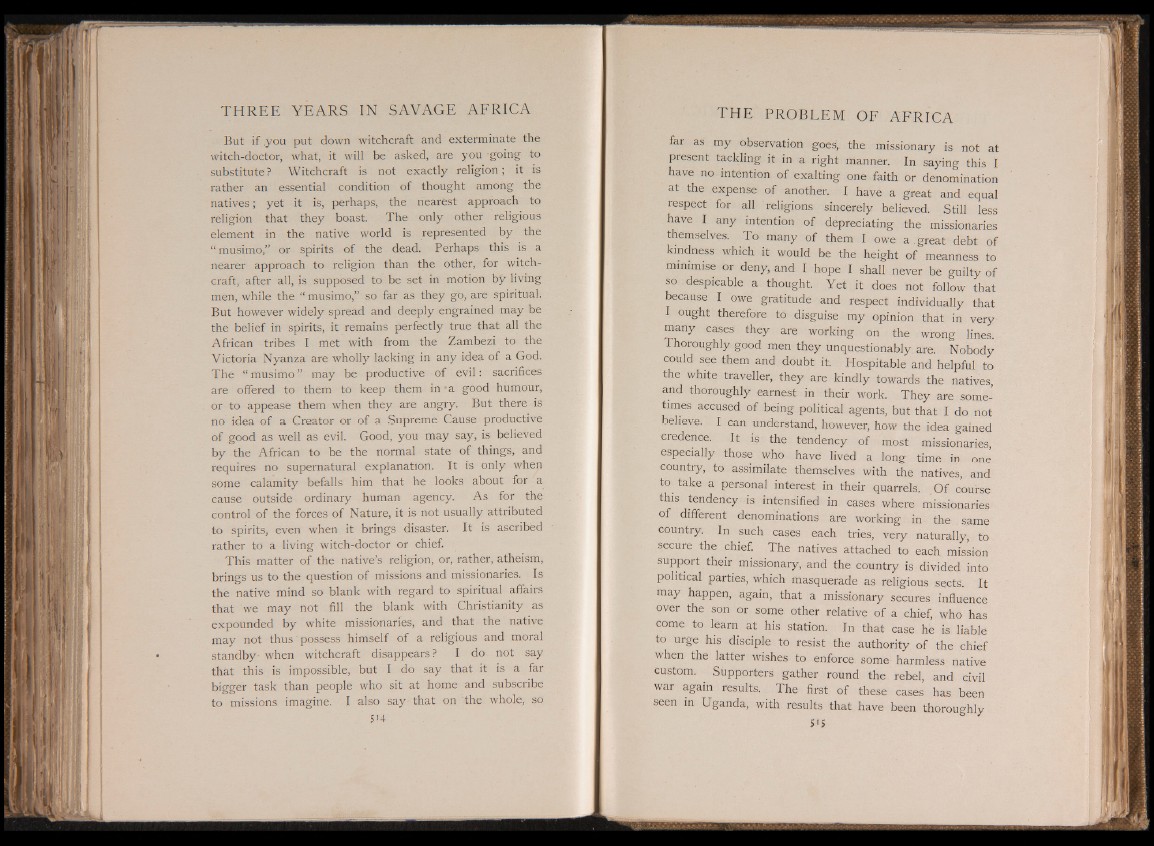
But if .you put down witchcraft and exterminate the
witch-doctor, what, it will be asked, are you going to
substitute ? W itchcraft is not exactly religion; it is
rather an essential condition of thought among the
natives; yet it is, perhaps, the nearest approach to
religion that they boast. The only other religious
element in the native world is represented by the
“ musimo,” or spirits of the dead. Perhaps this is a
nearer approach to religion than the other, for witchcraft,
after all, is supposed to be set in motion by living
men, while the “ musimo,” so far as they go, are spiritual.
But however widely spread and deeply engrained may be
the belief in spirits, it remains perfectly true that all the
African tribes I met with from the Zambezi to the
Victoria Nyanza are wholly lacking in any idea of a God.
The “ musimo ” may be productive of evil: sacrifices
are offered to them to keep them in *a good humour,
or to appease them when they are angry. But there is
no idea of a Creator or of a Supreme Cause productive
of good as well as evil. Good, you may say, is believed
by the African to be the normal state of things, and
requires no supernatural explanation. It is only when
some calamity befalls him that he looks about for a
cause outside ordinary human agency. As for the
control of the forces of Nature, it is not usually attributed
to spirits, even when it brings disaster. It is ascribed
rather to a living witch-doctor or chief.
This matter of the native’s religion, or, rather, atheism,
brings us to the question of missions and missionaries. Is
the native mind so blank with regard to spiritual affairs
that we may not fill the blank with Christianity as
expounded by white missionaries, and that the native
may not thus possess himself of a religious and moral
standby when witchcraft disappears? I do not say
that this is impossible, but I do say that it is a far
bigger task than people who sit at home and subscribe
to missions imagine. I also say that on the whole, so
5*4
far as my observation goes, the missionary is not at
present tackling it in a right manner. In saying this I
have no intention of exalting one faith or denomination
at the expense of another. I have a great and equal
respect for all religions sincerely believed. Still less
have I any intention of depreciating the missionaries
themselves. To many of them I owe a great debt of
kindness which it would be the height of meanness to
minimise or deny, and I hope I shall never be guilty of
so .despicable a thought. Yet it does not follow that
because I owe gratitude and respect individually that
I ought therefore to disguise my opinion that in very
many cases they are working on the wrong lines.
Thoroughly good men they unquestionably are. Nobody
could see them and doubt it. Hospitable and helpful to
the white traveller, they are kindly towards the natives,
and thoroughly earnest in their work. They are sometimes
accused of being political agents, but that I do not
believe. I can understand, however, how the idea gained
credence. It is the tendency of most missionaries,
especially those who have lived a long time in one
country, to assimilate themselves with the natives, and
to take a personal interest in their quarrels. Of course
this tendency is intensified in cases where missionaries
of different denominations are working in the same
country. In such cases each tries, very naturally, to
secure the chief. The natives attached to each mission
support their missionary, and the country is divided into
political parties, which masquerade as religious sects. It
may happen, again, that a missionary secures influence
over the son or some other relative of a chief, who has
come to learn at his station. In that case he is liable
to urge his disciple to resist the authority of the chief
when the latter wishes to enforce some harmless native
custom. , Supporters gather round the rebel, and civil
war again results. The first of these cases has been
seen in Uganda, with results that have been thoroughly
5G